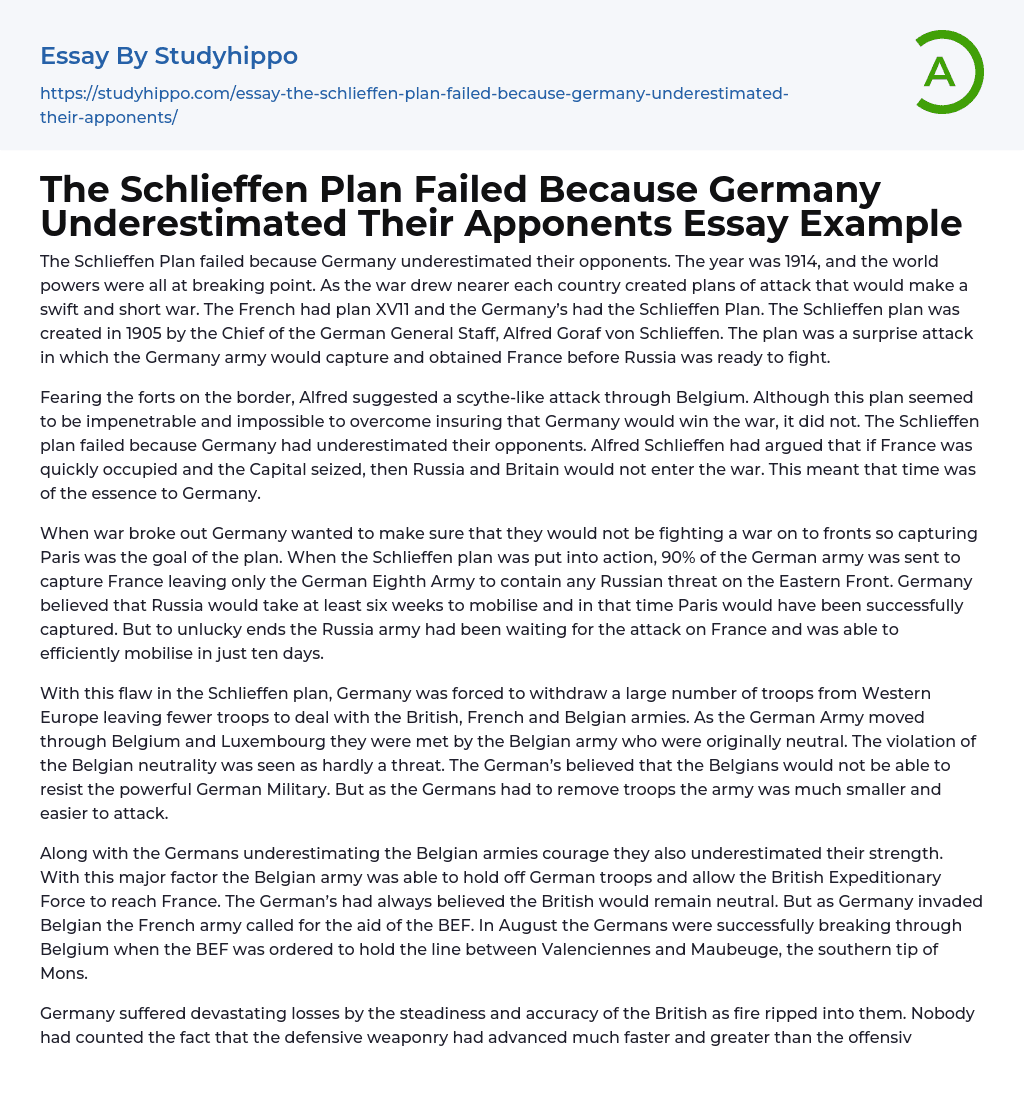

The Schlieffen Plan Failed Because Germany Underestimated Their Apponents Essay Example
The Schlieffen Plan failed because Germany underestimated their opponents. The year was 1914, and the world powers were all at breaking point. As the war drew nearer each country created plans of attack that would make a swift and short war. The French had plan XV11 and the Germany’s had the Schlieffen Plan. The Schlieffen plan was created in 1905 by the Chief of the German General Staff, Alfred Goraf von Schlieffen. The plan was a surprise attack in which the Germany army would capture and obtained France before Russia was ready to fight.
Fearing the forts on the border, Alfred suggested a scythe-like attack through Belgium. Although this plan seemed to be impenetrable and impossible to overcome insuring that Germany would win the war, it did not. The Schlieffen plan failed because German
...y had underestimated their opponents. Alfred Schlieffen had argued that if France was quickly occupied and the Capital seized, then Russia and Britain would not enter the war. This meant that time was of the essence to Germany.
When war broke out Germany wanted to make sure that they would not be fighting a war on to fronts so capturing Paris was the goal of the plan. When the Schlieffen plan was put into action, 90% of the German army was sent to capture France leaving only the German Eighth Army to contain any Russian threat on the Eastern Front. Germany believed that Russia would take at least six weeks to mobilise and in that time Paris would have been successfully captured. But to unlucky ends the Russia army had been waiting for the attack on France and was able to efficiently mobilise in
just ten days.
With this flaw in the Schlieffen plan, Germany was forced to withdraw a large number of troops from Western Europe leaving fewer troops to deal with the British, French and Belgian armies. As the German Army moved through Belgium and Luxembourg they were met by the Belgian army who were originally neutral. The violation of the Belgian neutrality was seen as hardly a threat. The German’s believed that the Belgians would not be able to resist the powerful German Military. But as the Germans had to remove troops the army was much smaller and easier to attack.
Along with the Germans underestimating the Belgian armies courage they also underestimated their strength. With this major factor the Belgian army was able to hold off German troops and allow the British Expeditionary Force to reach France. The German’s had always believed the British would remain neutral. But as Germany invaded Belgian the French army called for the aid of the BEF. In August the Germans were successfully breaking through Belgium when the BEF was ordered to hold the line between Valenciennes and Maubeuge, the southern tip of Mons.
Germany suffered devastating losses by the steadiness and accuracy of the British as fire ripped into them. Nobody had counted the fact that the defensive weaponry had advanced much faster and greater than the offensive technology. Then as quickly as the British army started firing they withdrew. The German Schlieffen plan was going like clockwork. They blasted through the French border and were on their way to Paris. But Britain and France wouldn’t give up that easily.
They still fought the German Army right up to 60km South of Marne
where the German army ordered an abrupt retreat and began building trenches to end all hope of a short war. The Schlieffen plan had failed. Alfred Schlieffen’s initial assumptions had been flawed. The plan failed due not only to the mistakes made in execution but also due to the causes that could have been foreseen and dealt with. The German army underestimated their opponents at was what lead to the failure in the plan. The results of these mistakes lead Europe into the four long years of bitter trench warfare.
- League Of Nations essays
- Battle Of The Somme essays
- Treaty Of Versailles essays
- African American essays
- African American Culture essays
- American Values essays
- Asian American essays
- Chinese essays
- Ethnicity essays
- Ethnocentrism essays
- German essays
- Han Chinese essays
- Hispanic essays
- Identity essays
- Korean essays
- Mexican essays
- Nation essays
- Native American essays
- Race and Ethnicity essays
- White People essays
- Athens essays
- Belgium essays
- Berlin essays
- British essays
- England essays
- Germany essays
- Great britain essays
- Greece essays
- Ireland essays
- Italy essays
- London essays
- Paris essays
- Pompeii essays
- Rome essays
- Russia essays
- Spain essays
- United Kingdom essays
- Absolutism essays
- Appeal essays
- Bourgeoisie essays
- Contras essays
- Corporate Governance essays
- Corruption essays
- Democracy essays
- Democratic Party essays
- Developed Country essays
- Dictatorship essays
- Elections essays
- European Union essays
- Federalism essays



